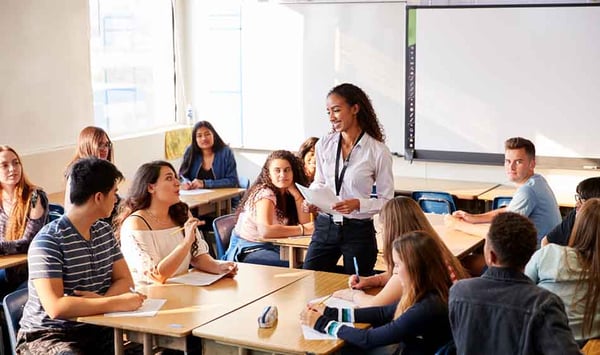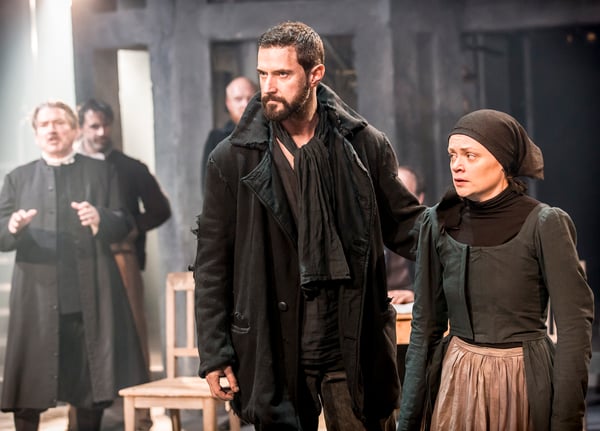13 September 2021
How can the arts support SEL and student wellbeing?
Hannah Marr
Director of Education, Digital Theatre+
Theatre is a gym for empathy. It’s where we can go to build up the muscles of compassion, to practice listening and understanding and engaging with people that are not just like ourselves. We practice sitting down, paying attention and learning from other people’s actions.
Bill English San Francisco Playhouse
If you’ve ever left the theatre, a concert or an exhibition bubbling with excitement, swapping opinions with your companions and already looking forward to your next visit, you’ll need little persuading of the power of the arts to have a positive impact on your wellbeing. So what does that same positive impact look like for students?
Of course there are school trips. But those are probably few and far between – as well as potentially hazardous to the wellbeing of any staff involved! What are some more sustained ways that the arts can support social and emotional learning (SEL) and, relatedly, student wellbeing?
Social and emotional learning is defined by CASEL as “the process through which all young people and adults acquire and apply the knowledge, skills, and attitudes to develop healthy identities, manage emotions and achieve personal and collective goals, feel and show empathy for others, establish and maintain supportive relationships, and make responsible and caring decisions”. CASEL describes five core competencies:
- Self-awareness
- Self-management
- Responsible decision-making
- Relationship skills
- Social awareness
If we support students to develop strong skills in each of these five areas, they are far more likely to be able to manage or mitigate any difficulties that come their way, increasing their overall mental and emotional wellbeing. Let’s look at each one in turn.

Self-awareness
Students may sometimes find it easier and safer to examine aspects of self-awareness through an intermediary, i.e. through working up a character. This could be a character from a play, where analysis of the script will give clues to what the character is like – and why – or a character that students create from scratch.
You can also develop self-awareness skills via reflections at the end of activities, and in particular group practical activities, where students can be asked to reflect on their contribution and role within the group as a whole, encouraging a growth mindset.
Self-management
A lack of self-management skills can lead to a lot of, well, drama! So it’s fair to say that there are plenty of exemplars of poor self-management to be found amongst literary characters:
- Othello falling prey to Iago’s manipulations because of his insecurity and jealousy
- Omari in Pipeline getting into an altercation with his teacher
- Ovid’s Deianaria wreaking revenge on her husband Hercules
Use these characters and scenes from the plays as stimuli for group discussions and workshop activities on why self-management is important, any similar situations students might have found themselves in, and how the characters might have been able to avert tragedy if they’d had a bit more self-control.

Responsible decision-making
A group project such as staging a scene requires hundreds of decisions, all of which need to be made collaboratively. Which scene to do. Who will play which part. When and how to rehearse. What costumes and props are needed. What to do when the lead actor comes down with tonsillitis. And so on and so on.
Encourage students to make as many of these decisions for themselves as possible, and to reflect on why they’ve come to that decision. They can also watch interviews with theatre practitioners for insights into how professionals make these kinds of decisions every day in their work.
Relationship skills
As with decision-making, the inherently collaborative nature of art forms such as theatre and dance mean that they are extremely powerful for developing strong relationship skills such as effective communication, negotiation, leadership and teamwork.
Dance and movement-based theatre can be a particularly effective visual representation of teamwork and collaboration, as all the dancers have to work together to build the piece.
Social awareness
At its core, social awareness relies on empathy and the ability to recognise the perspectives of others, and this is exactly what understanding literature both requires and develops. This may be through reading a first-person narrative where the narrator is very different from yourself, or through watching a play set somewhere very different from where you live and go to school. Literature also addresses important social issues, whether indirectly as in The Crucible’s metaphorical comment on McCarthyism, or directly as in The Container’s exploration of immigration and exclusion.

Finally, it’s also always worth noting that in order to support your students’ wellbeing you need to look after your own wellbeing as well. Try and make time for your own interactions with the arts, whether that’s a theatre visit, a cinema trip, or just an evening in with a cup of cocoa and a good book!
Further reading
Related blogs
How to create a social contract for your classroom
It’s that time of year again. Time to prepare your classroom, get your lesson plans in order and...
Read more5 tips for bringing life skills into your classroom
Preparing students for life outside the classroom (be that their personal lives, college,...
Read more7 series to simplify theatre lesson planning and curriculum design
Looking for easy ways to design impactful theatre lesson plans? To save you time, Digital...
Read moreGet the latest teaching tips straight to your inbox
Explore free lesson ideas and inspiration, education news, teaching trends and much more by signing up to regular blog updates!





